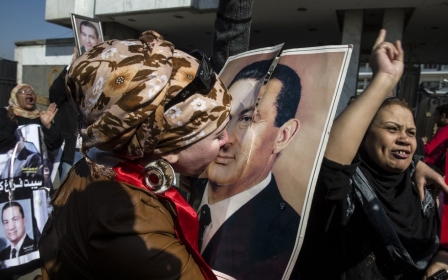Egypt sacks forensic spokesman who blamed protester’s death on her weight

The Egyptian government fired forensic authority spokesperson Hisham Abdel Hamid from his post on Tuesday, following his comments in which he blamed a protester’s slight weight as the cause for her death from bird pellet wounds.
Shaima al-Sabbagh, a 31 year old mother of a 5 year old boy and a member of a leftist socialist party was killed on 24 January a day before the anniversary of Egypt’s 2011 uprising.
A small group of protesters, Sabbagh included, were marching to Tahrir Square, the epicentre of the protests, to lay down flowers. Before they got to the square, riot police forces shot tear gas and birdshot at close range. Sabbagh died in the arms of another protester, as she was wounded with birdshot pellets to her chest and at the left side of her face.
The unforgettable images of Sabbagh dying, which was also captured on video, transformed her into the latest symbol against police brutality. As outrage spread amongst the public, President Abdel Fattah el-Sisi was prompted to call for an inquiry into her death.
In a television interview on Saturday, Hisham Abdel Hamid angered viewers after he blamed Sabbagh’s death on her lack of body fat.
“She was very thin,” he said. “She did not have any percentage of fat. So the small pellets penetrated very easily, and four or five out of all the pellets that penetrated her body-these four or five pellets were able to penetrate her heart and lungs, and these are the ones that caused her death.”
Hamid claimed that the man marching next to Sabbagh, who was also struck by birdshot wounds, survived the shots because he had more body fat, saying that Sabbagh “was basically skin on bones.”
The shots that had perforated the young mother’s chest were fired at a distance of no more than eight yards, which according to Hamid usually caused injuries but not death.
His comments elicited condemnation and criticism from activists and international human rights organisations.
“These sorts of ridiculous claims just add a thick layer of absurdity to the government’s endless record of killings and impunity,” said Human Rights Watch’s Sarah Leah Whitson.
On Tuesday, Hamid told AFP that he had been sacked following the television and shared the letter that notified him of his dismissal.
The letter told him he was being relieved of his job “in light of what is required by the interests of the profession” and for giving an unauthorised interview.
He added that he was fired because during the interview he criticised colleagues who conducted an autopsy on an activist whose death was ruled an accident.
Last week, Egyptian prosecutors said that they were charging a police officer, who they did not name, with “battery causing death” in the killing of Shaima al-Sabbagh, and that he will stand trial before a criminal court.
The prosecutors said that they would also charge some of Sabbagh’s fellow protesters with staging an illegal demonstration and threatening the public order.
New MEE newsletter: Jerusalem Dispatch
Sign up to get the latest insights and analysis on Israel-Palestine, alongside Turkey Unpacked and other MEE newsletters
Middle East Eye delivers independent and unrivalled coverage and analysis of the Middle East, North Africa and beyond. To learn more about republishing this content and the associated fees, please fill out this form. More about MEE can be found here.




